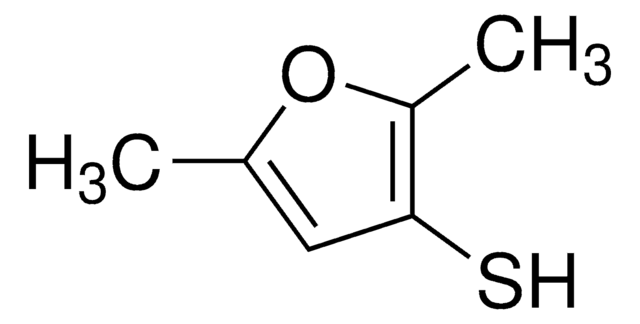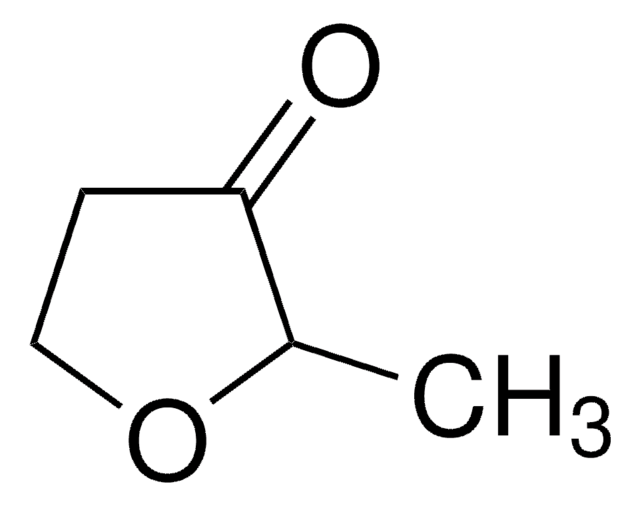W318809
2-Methyl-3-furanthiol
≥95%, FG
Sinónimos:
2-methyl-3-furyl mercaptan, Fish thiol, Oxy cyclothione-030
About This Item
Productos recomendados
origen biológico
synthetic
Nivel de calidad
grado
FG
Fragrance grade
Halal
Kosher
Agency
follows IFRA guidelines
cumplimiento norm.
EU Regulation 1223/2009
EU Regulation 1334/2008 & 178/2002
densidad de vapor
>1 (vs air)
Análisis
≥95%
índice de refracción
n20/D 1.518 (lit.)
bp
57-60 °C/44 mmHg (lit.)
densidad
1.145 g/mL at 25 °C
aplicaciones
flavors and fragrances
Documentación
see Safety & Documentation for available documents
alérgeno alimentario
no known allergens
alérgeno de la fragancia
no known allergens
Organoléptico
fishy; meaty; metallic; sulfurous
cadena SMILES
Cc1occc1S
InChI
1S/C5H6OS/c1-4-5(7)2-3-6-4/h2-3,7H,1H3
Clave InChI
RUYNUXHHUVUINQ-UHFFFAOYSA-N
¿Está buscando productos similares? Visita Guía de comparación de productos
Descripción general
Aplicación
- Elucidating salt-reduction mechanisms of aroma-active compounds from yeast extracts through sensomics approaches and electroencephalography.: This innovative study leverages both sensory science and neurotechnology to uncover how 2-methyl-3-furanthiol and other key compounds in yeast extracts can enhance flavor profiles while reducing sodium content in foods, aligning with health trends and consumer demands for lower-sodium options (Shan et al., 2024).
- Widely Targeted Metabolomics and Network Pharmacology Reveal the Nutritional Potential of Yellowhorn (Xanthoceras sorbifolium Bunge) Leaves and Flowers.: This study demonstrates the use of targeted metabolomics to profile bioactive compounds, including 2-methyl-3-furanthiol, in Yellowhorn plant parts, which are emerging as a nutritional powerhouse with potential health benefits (Sha et al., 2024).
- Metabolomics reveals factors affecting the radical reaction of sulfides during thermal processing for meaty aroma.: This research identifies how 2-methyl-3-furanthiol and other sulfides interact during cooking to create rich, meaty flavors, providing valuable insights for the culinary industry on optimizing flavor profiles in cooked meats (Zhang et al., 2024).
Acciones bioquímicas o fisiológicas
Palabra de señalización
Danger
Frases de peligro
Consejos de prudencia
Clasificaciones de peligro
Acute Tox. 3 Oral - Flam. Liq. 3
Código de clase de almacenamiento
3 - Flammable liquids
Clase de riesgo para el agua (WGK)
WGK 3
Punto de inflamabilidad (°F)
98.6 °F - closed cup
Punto de inflamabilidad (°C)
37 °C - closed cup
Equipo de protección personal
Eyeshields, Faceshields, Gloves, type ABEK (EN14387) respirator filter
Certificados de análisis (COA)
Busque Certificados de análisis (COA) introduciendo el número de lote del producto. Los números de lote se encuentran en la etiqueta del producto después de las palabras «Lot» o «Batch»
¿Ya tiene este producto?
Encuentre la documentación para los productos que ha comprado recientemente en la Biblioteca de documentos.
Los clientes también vieron
Nuestro equipo de científicos tiene experiencia en todas las áreas de investigación: Ciencias de la vida, Ciencia de los materiales, Síntesis química, Cromatografía, Analítica y muchas otras.
Póngase en contacto con el Servicio técnico














